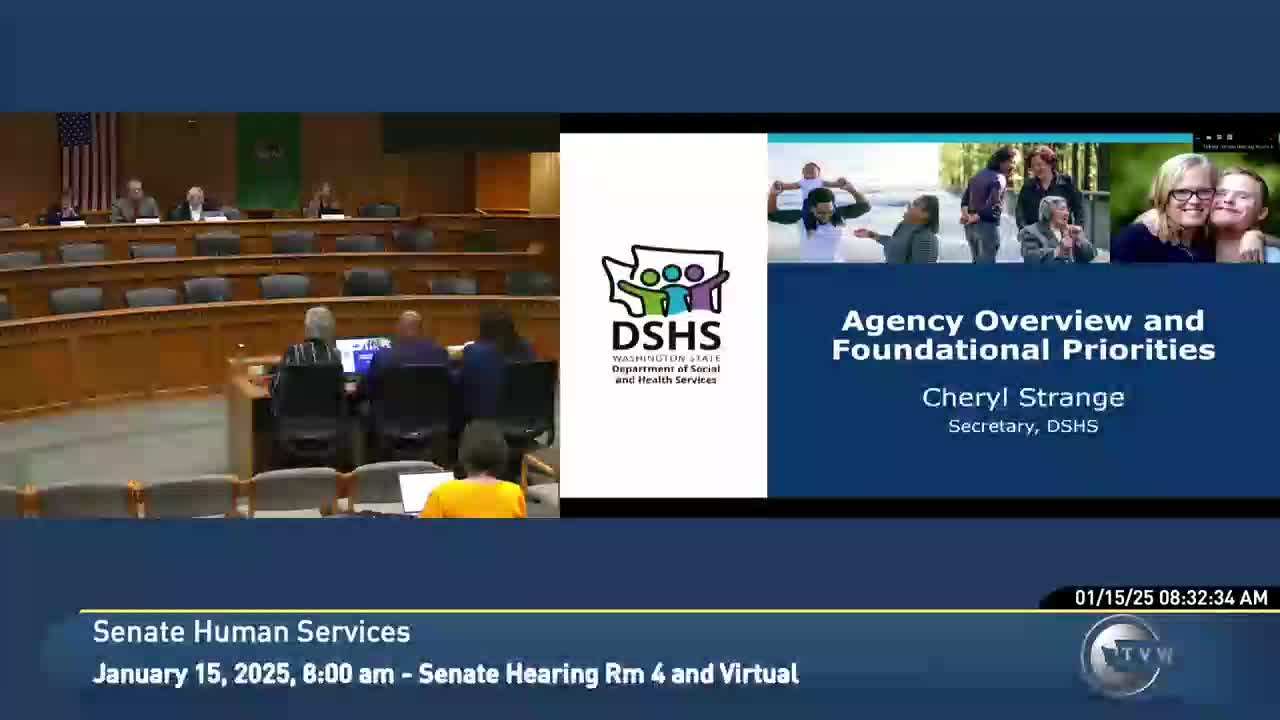New DSHS leadership outlines priorities: food supports, tech modernization, DDA community capacity
Get AI-powered insights, summaries, and transcripts
Subscribe
Summary
Incoming DSHS Secretary Cheryl Strange told the Senate Human Services Committee the agency will prioritize preserving core safety-net benefits, continuing technology modernization to improve access, and expanding community capacity for people with developmental disabilities.
Cheryl Strange, incoming secretary of the Department of Social and Health Services (DSHS), and DSHS leaders gave a high-level overview of the agency’s Economic Services Administration and Developmental Disabilities Administration at the committee hearing.
Strange said DSHS revised its mission after broad stakeholder engagement and now describes the department’s role as partnering “with people to access support, care, and resources.” She outlined enterprise priorities including protecting access to SNAP, TANF, cash and medical assistance for roughly 1.8 million Washingtonians who rely on safety-net services, continuing technology modernization to meet federal rules, and compliance with court settlements that affect behavioral health and competency evaluation timelines.
Terry Redmond, assistant secretary for the Economic Services Administration, described ESA divisions and customer-facing programs. He noted ESA provides services that include basic food (SNAP), summer food programs for school-age children, cash assistance, child support services, the Office of Refugee and Immigrant Assistance and disability-determination services. Redmond highlighted the state’s Summer benefit program (referred to in testimony as “Sunbucks”), which in 2024 provided $120 in summer food benefits per eligible child and distributed more than $71.5 million to feed nearly 600,000 children. He described operational challenges, including legacy technology that contributes to long customer wait times and safety incidents at some community service offices, and asked for continued funding to complete integrated eligibility and enrollment modernization so customers can apply once for multiple programs.
Toni Joseph, assistant secretary for the Developmental Disabilities Administration, urged a whole-of-government approach to improve community capacity for people with intellectual and developmental disabilities. DDA serves roughly 63,000 clients in a range of settings; Joseph emphasized that about 87% live at home with family caregivers and that the system must plan for aging caregivers and alternative housing and supports. She described DDA investments such as co‑occurring youth transitional facilities opened in partnership with other state agencies and health systems, and said community residential habilitation centers represent a small share of DDA’s overall budget.
Committee members asked about program details, colocation of services, workforce needs, and how state investments in technology and community housing could reduce reliance on institutional care. DSHS leaders said they will continue to provide follow-up information and work with the legislature on agency-request legislation to fund implementation needs.
